-
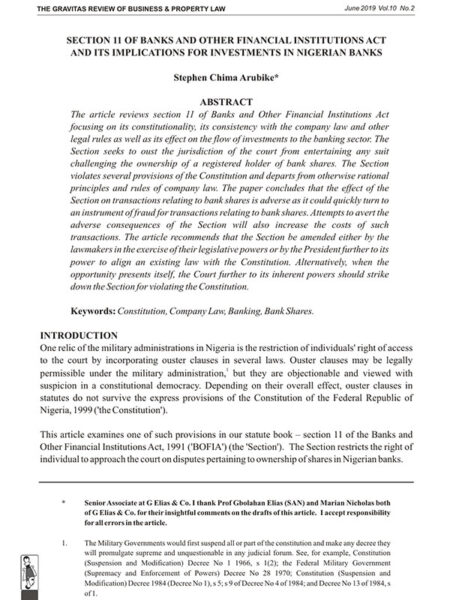
Section 11 of Banks and Other Financial Institutions Act and Its Implications for Investments in Nigerian Banks
0₦2,500.00Stephen Arubike, Senior Associate at G Elias & Co., Lagos Nigeria in his article, Section 11 of Banks and Other Financial Institutions Act and its implications for Investments in Nigerian Banks, examines the implication of section 11 BOFIA which ousts the jurisdiction of the courts in any suit challenging the ownership of a registered holder of bank shares. Stephen considers several decided cases and scholarly on the concludes that the section violates several provisions of the 1999 Constitution of Nigeria and departs from rational principles and rules of company law. He concludes that the section could have negative consequences on dealings and transactions in bank shares and ought to be struck down by the courts or amended by the parliament.
-
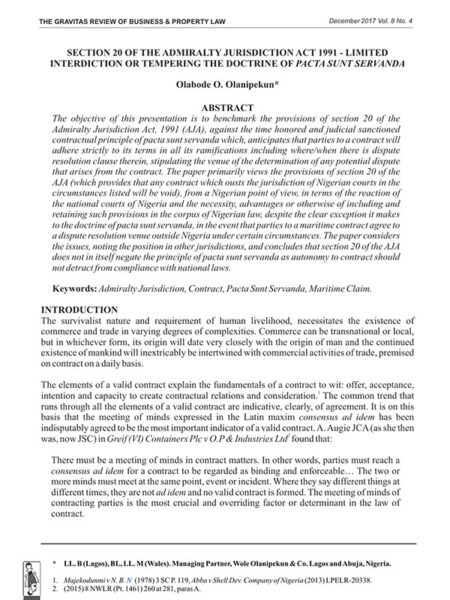
Section 20 of the Admiralty Jurisdiction Act 1991 – Limited Interdiction or Tempering the Doctrine of Pacta Sunt Servanda
0₦2,500.00Olabode Olanipekun, Managing Partner, Wole Olanipekun & Co, in his article, “Section 20 of the Admiralty Jurisdiction Act 1991 – Limited Interdiction or tempering the Doctrine of Pacta Sunt Servanda“, benchmarks the provision of section 20 of the Admiralty Jurisdiction Act, 1991, which invalidates any contractual provision that ousts the jurisdiction of Nigerian courts in the circumstances listed in the section, against the time honored and judicial sanctioned contractual principle of pacta sunt servanda, which anticipates that parties to a contract will adhere strictly to its terms in all its ramifications including the venue of the determination of any dispute that arises from the contract. He reviews the issues against the background of decided cases, noting the position in other jurisdictions, and concludes with a thought on the Hamburg Rules and dispute resolution.
-
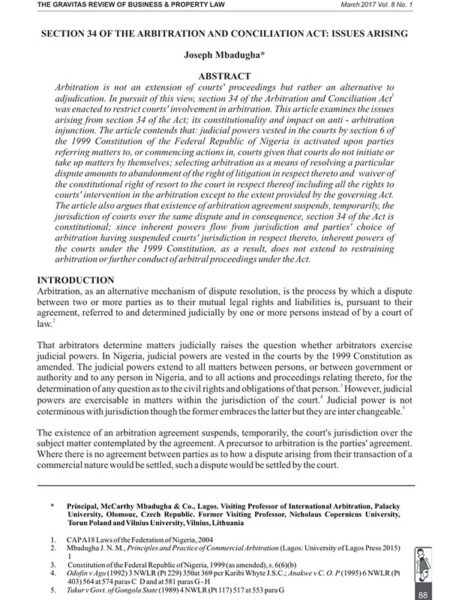
Section 34 of the Arbitration and Conciliation Act: Issues Arising
0₦2,500.00Joseph Mbadugha of McCarthy Mbadugha & Co and Visiting Professor of International Arbitration, Palacky University, Olomouc, Czech Republic in his article “Section 34 of the Arbitration and Conciliation Act: Issues Arising” examines the constitutionality of section 34 of the Arbitration and Conciliation Act. He contends that selecting arbitration as a means of resolving a particular dispute amounts to abandonment of the right of litigation and waiver of the constitutional right of resort to the court. He argues that parties’ choice of arbitration suspends the jurisdiction of courts over the same dispute and in consequence, section 34 is constitutional. He concludes that the inherent powers of the courts under the 1999 Constitution does not extend to restraining arbitration or further conduct of arbitral proceedings.
-
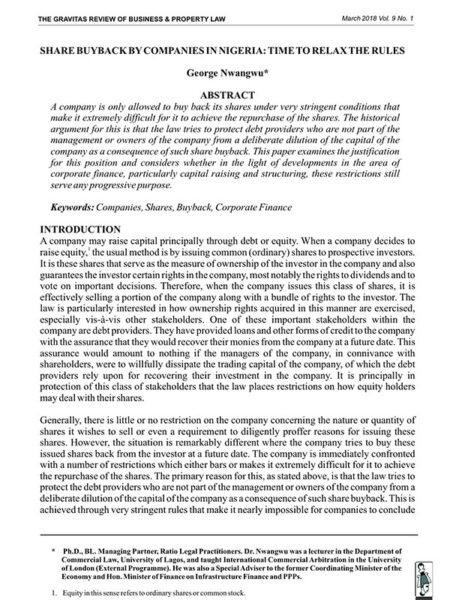
Share Buyback by Companies in Nigeria: Time to Relax the Rule
0₦2,500.00Dr. George Nwangwu, Managing Partner, Ratio Legal Practitioners, and Special Adviser to the ex-Minister of Finance on Infrastructure Finance and PPPs, in his article, “Share Buyback by Companies in Nigeria: Time to Relax the Rules” notes that a Nigerian company is allowed to buy back its shares under very stringent conditions that make it extremely difficult for it to achieve the repurchase of the shares. The historical argument for this is the protection of debt providers, who are not part of the management or owners of the company, from a deliberate dilution of the capital of the company as a consequence of such share buyback. He examines the justification for this position and considers whether in the light of developments in corporate finance, particularly capital raising and structuring, these restrictions still serve any useful.
-
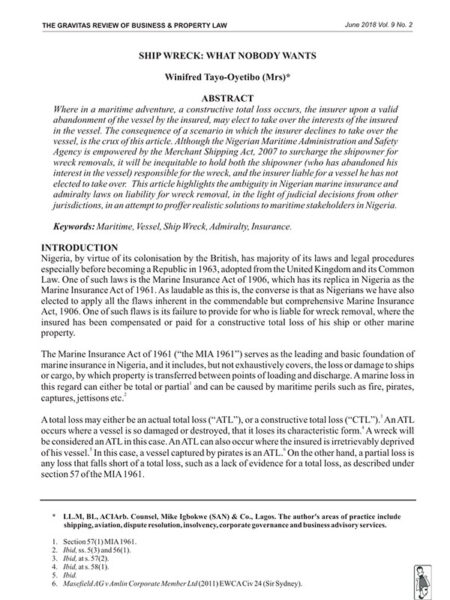
Ship Wreck: What Nobody Wants
0₦2,500.00Winifred Tayo-Oyetibo (Mrs) of Mike Igbokwe (SAN) & Co in her article, Ship Wreck: What Nobody Wants notes that where in a maritime adventure, a constructive total loss occurs, and the insurer having paid the shipowner declines to be saddled with the shipwreck, who then has the responsibility for its evacuation, removal or treatment? Tayo-Oyetibo in a masterly way argues that it will be inequitable to hold the shipowner who has abandoned his interest in the vessel responsible for the wreck, or the insurer who has elected not to take over, liable. She explores the provision of the Marine Insurance Act of 1961 and the 2007 highlighting the ambiguity in the Nigerian laws.
-
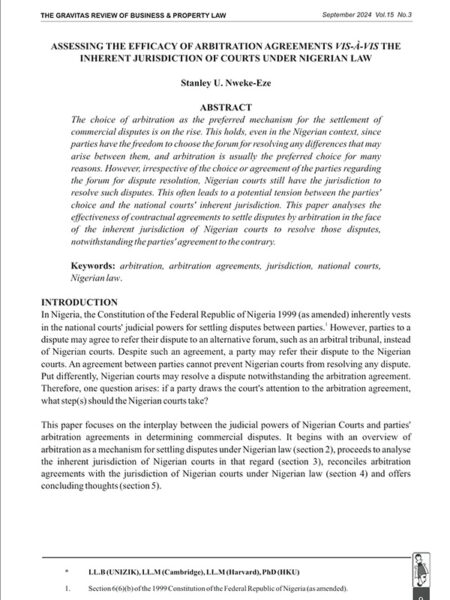
Situating the Efficacy of Arbitration Agreements Vis-à-Vis the Inherent Jurisdiction of National Courts under Nigerian Law
0₦2,500.00Stanley Nweke-Eze, in his article Situating the Efficacy of Arbitration Agreements Vis-à-Vis the Inherent Jurisdiction of National Courts under Nigerian Law, examines the efficacy of Arbitration agreements in the settlement of commercial disputes and the jurisdiction of national courts. The choice of arbitration as the preferred mechanism for the settlement of commercial disputes is on the rise. This holds true, even in the Nigerian context, since parties have the freedom to choose the forum for resolving any differences that may arise between them, and arbitration is usually the preferred choice for a myriad of reasons. However, irrespective of the choice or agreement of the parties regarding the forum for dispute resolution, a party may still invoke the inherent jurisdiction of the Nigerian courts to resolve such disputes. Oftentimes, this leads to a potential tension between the choice of the parties and the inherent jurisdiction of the national courts. Nweke-Eze analyses the effectiveness of contractual agreements to settle disputes by arbitration in the face of the inherent jurisdiction of Nigerian courts to resolve those disputes, notwithstanding the parties’ agreement to the contrary.
-
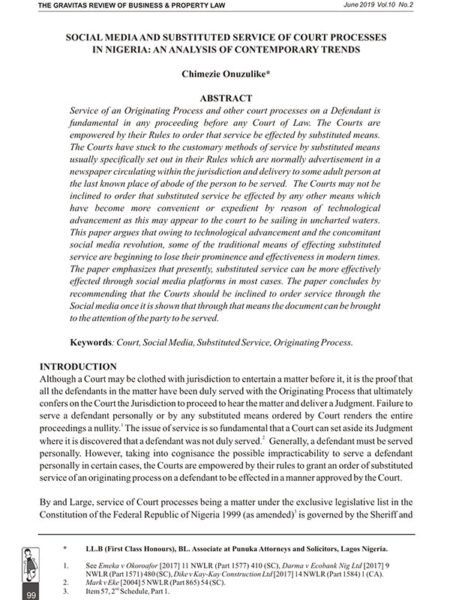
Social Media and Substituted Service of Court Processes in Nigeria: An Analysis of Contemporary Trends
0₦2,500.00Chimezie Onuzulike, Associate at Punuka Attorneys and Solicitors, Lagos Nigeria in his article, Social Media and Substituted Service of Court Processes in Nigeria: An Analysis of Contemporary Trends, peruses various High Court Rules and posits that despite the courts sticking to the customary methods of service by substituted means, normally advertisement in a newspaper circulating within the jurisdiction or delivery to some adult person at the last known place of abode of the person to be served, there may be room for substituted service through the social media. He argues that owing to technological advancement and the concomitant social media revolution, substituted service can be more effectively effected through social media platforms. He concludes that though a Nigerian court has blazed the trail, should be inclined to order service through the social media once it is shown that through that means the document can be brought to the attention of the party to be served.
-
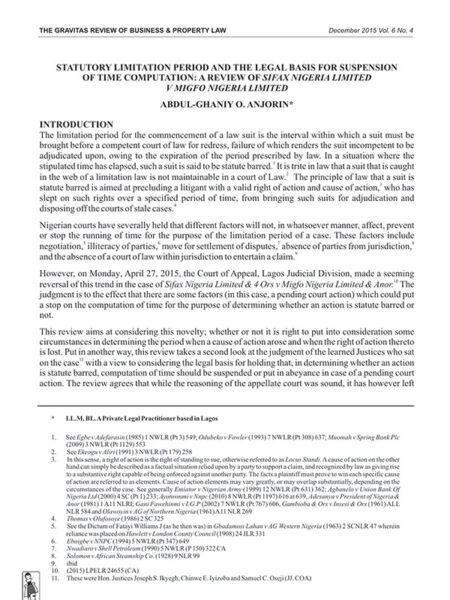
Statutory Limitation Period and the Legal Basis for Suspension of Time Computation: A Review of Sifax Nigeria Limited v. Migfo Nigeria Limited
0₦2,500.00When the clock stops ticking: Abdulghaniy Anjorin explores a recondite issue of law in “Statutory Limitation Period and the Legal Basis for Suspension of Time Computation: A Review of Sifax Nigeria Limited v Migfo Nigeria Limited”.
-
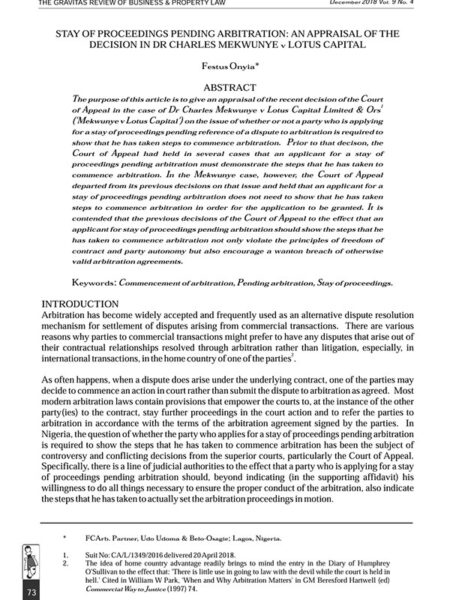
Stay of Proceedings Pending Arbitration: An Appraisal of the Decision in Dr Charles Mekwunye v Lotus Capital
0₦2,500.00Festus Onyia, Partner, Udo Udoma & Belo-Osagie in his article, Stay of Proceedings Pending Arbitration: An Appraisal of the Decision in Dr Charles Mekwunye v Lotus Capital, considers the vexed issue of whether a party who is applying for a stay of proceedings pending reference of a dispute to arbitration is required to show that he has taken steps to commence arbitration. He analyses various Nigerian cases on the issue including the recent decision of the Court of Appeal in Mekwunye v Lotus Capital and concludes that the decision aligns with the current judicial attitude towards arbitration agreements.
-
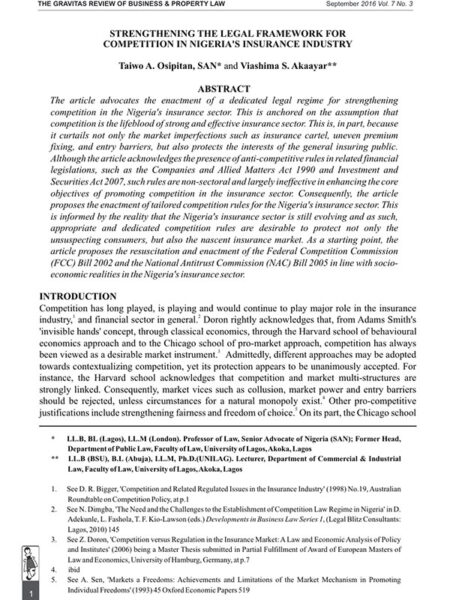
Strengthening the Legal Framework for Competition in Nigeria’s Insurance Industry
0₦2,500.00Professor Taiwo Osipitan, SAN and Dr. Viashima Akaayar of the Faculty of Law, University of Lagos in their article, “Strengthening the Legal Framework for Competition in Nigeria’s Insurance Industry” examine the concept and theories of Competition. Though they acknowledge the presence of antitrust rules in financial legislations such as the Companies and Allied Matters Act 1990 and the Investment and Securities Act 2007, they posit that such rules are non-sectoral and largely ineffective in enhancing the core objectives of promoting competition in the insurance sector. To protect unsuspecting customers, they propose the resuscitation and enactment of the Federal Competition Commission (FCC) Bill and the National Antitrust Commission (NAC) Bill.
-
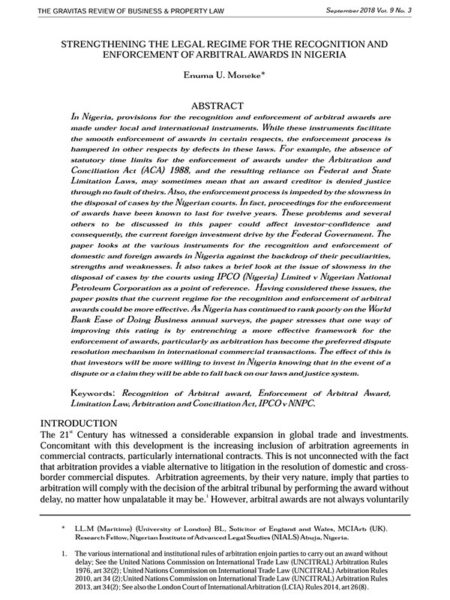
Strengthening the Legal Regime for the Recognition and Enforcement of Arbitral Awards in Nigeria
0₦2,500.00Enuma Moneke, Research Fellow, Nigerian Institute of Advanced Legal Studies, Abuja, in his article, Strengthening the Legal Regime for the Recognition and Enforcement of Arbitral Awards in Nigeria, notes that local and international instruments provide for the recognition and enforcement of arbitral awards in Nigeria. While these instruments facilitate the smooth enforcement of awards in certain respects, the enforcement process is hampered in other respects by defects in these laws. For example, the absence of statutory time limits for the enforcement of awards under the Arbitration and Conciliation Act (ACA) 1988, and the resulting reliance on Federal and States’ Limitation Laws may sometimes mean that an award creditor is denied justice through no fault of theirs. He examines the various instruments for the recognition and enforcement of domestic and foreign awards in Nigeria against the backdrop of their peculiarities, strengths and weaknesses.
-
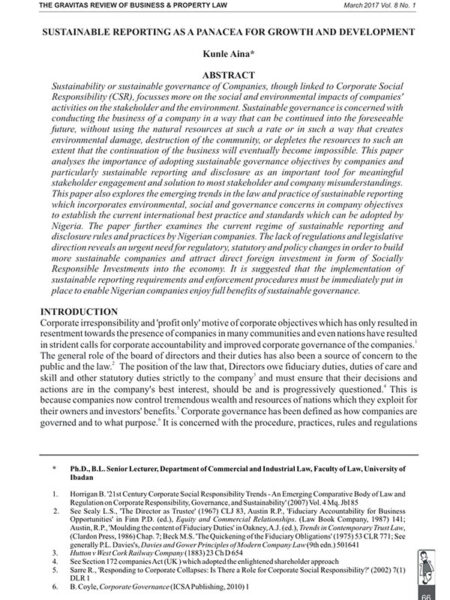
Sustainable Reporting as a Panacea for Growth and Development
0₦2,500.00Dr Kunle Aina of the Department of Commercial and Industrial Law, University of Ibadan in his article “Sustainable Reporting as a Panacea for Growth and Development” examines the concept of Sustainable Reporting, which is reporting the social and environmental impact of corporate activities on stakeholders and the environment. He analyses the importance of adopting sustainable governance objectives by companies and particularly sustainable reporting and disclosure as an important tool for meaningful stakeholder engagement and solution to most stakeholder and company misunderstandings. He reviews international best practices on Sustainable Reporting and bemoans the legislative and regulatory framework for sustainable governance and reports in Nigeria which are so scanty as to be classified as non-existent.
The Gravitas Review of Business & Property Law



